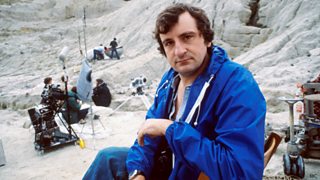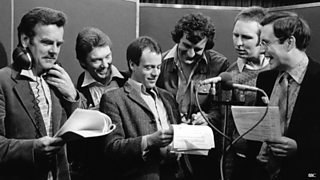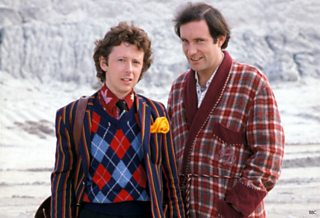The Sunday Post - Douglas Adams: So long and thanks for all the scripts
Andrew Martin
�������� Genome
Tagged with:

Unfeasibly tall author Douglas Adams on location in the �������� gravel pit for the TV version of Hitchhiker's Guide to the Galaxy. Those other people aren't small, they're just far away
Writers are strange people, but some are stranger than others. Comedy writers are perhaps doubly strange, because they write to make us laugh, which can be especially difficult.
Douglas Adams, who died in May 2001, was a very particular sort of comedy writer. While famous as the creator of The Hitchhiker’s Guide to the Galaxy, he was not hugely prolific. Granted, he didn’t need to be given Hitchhiker’s success, but he suffered greatly from writer’s block, an acute affliction in such an insecure profession. Adams was also involved in two of the biggest cult programmes of the last 50 years, Monty Python’s Flying Circus and Doctor Who.
Born in Cambridge in 1952, he excelled in creative writing at school, and won a place at St John’s College Cambridge in 1971 to read English. Not immediately a member of the famous Footlights Club, he formed comedy group Adams-Smith-Adams with two fellow students, going on to join before he graduated in 1974, where he was spotted by Monty Python’s Graham Chapman.
Chapman recruited Adams to provide sketches and make minor appearances in the fourth series of . Made without the involvement of John Cleese, the show struggled to maintain its quality, and was ended by mutual consent after just six episodes instead of the normal 13. Adams continued to write despite this and other setbacks, including the one-off pilot episode of Chapman’s show . It was the one failure of the various post-Python projects.
His writing career struggled for a while and he took a series of menial jobs. Benefitting from his Footlights contacts, he started contributing to radio comedies such as and The Burkiss Way (by whom he was spoofed in later series). Long interested in science fiction (he submitted a poem in the 1960s to The Eagle comic, which featured space pilot Dan Dare), he began sending in storylines to the Doctor Who production office in the mid-1970s.

'Hang on while I just finish the script...' A production shot from the 1978 Hitchhiker's special, with David Tate, Alan Ford, Geoffrey McGivern, Douglas Adams, Mark Wing-Davey and Simon Jones
But Adams’ greatest work was just on the horizon: inspired by factual books such as The Hitchhiker’s Guide to Europe, and his own experience of lying drunk in a field near Innsbruck, looking at the stars, he conceived a comedy about various ways in which the world could come to an end; one of these became the basis of an eventual Radio 4 series commission.
An ordinary man, Arthur Dent, is rescued from the destruction of Earth by his best friend, an alien with the unlikely name of Ford Prefect, who turns out to be a researcher for the electronic book (an unlikely concept in 1978) . Tea-loving, dressing-gown clad Arthur is upset that the Earth’s entry in this tome is limited to the phrase “mostly harmless”.
Meeting two other space-travellers, Earthwoman Trillian and three-armed, two-headed Zaphod Beeblebrox (and a depressed robot called Marvin), Arthur discovers that the Earth was actually a giant computer, built for a race of aliens who wanted to discover the meaning of life, the universe, and everything. Arthur and Ford at last end up on a primeval Earth, having discovered that the answer to the ultimate question of life, the universe and everything is 42.
That was as far as the first series got, but the story continued with a one-off episode aired at Christmas and a five-part in 1980. Adams had experienced problems meeting deadlines for the first series, which was to become an on-going problem, this time due to his also being asked to write a story for the 1978-9 series of Doctor Who.
Adams’s is clearly from the same imagination as Hitchhiker’s, with a half-robotic pirate captain (complete with electronic parrot) who materialises a hollow planet around other planets in order to use them as fuel for a secret purpose. When there was a vacancy for a script editor on Doctor Who at the end of the season, Adams was appointed – despite his existing job as a radio producer, and the prospect of more Hitchhiker's.
The 1979-80 series of Doctor Who was heavily criticised by the show’s fans at the time, who were not keen on the post-modern style of humour. But with an ITV strike, the programme got huge ratings, and due to script problems, Adams was forced to contribute heavily to the show.

Doctor Who takes a trip to a wet-looking Paris in Douglas Adams's 1979 tale City of Death
The second story of the season was called , developed from a story by experienced writer David Fisher. When the script got into difficulties, Adams quickly wrote a replacement with only the faintest resemblance to Fisher’s tale. For contractual reasons the writing was credited to �������� in-house pseudonym David Agnew. Adams also ended up writing the final, six-episode story of the season, Shada – but in the event, a strike at the �������� led to production being abandoned, and the story was to remain unfinished (though later resurrected on ).
By the time the second series of Hitchhiker’s Guide to the Galaxy was transmitted in early 1980, it was already a multi-media phenomenon. Adams’s book of the series was a bestseller, and there was an album version, as well as a stage show mounted by Ken Campbell. All these versions had slight plot differences, which would be a continuing feature of Adams’s work.
Work also began on a television version of , which appeared in January 1981. Many of the same cast were involved, but while the end result was impressive, it was not quite successful enough for a second series, and very expensive due to the need to bring to life some of Adams’s epic conceptions.
One of the problems encountered was those sequences involving passages from the Guide itself. These were voiced by the urbane Peter Jones, but on television it was necessary to illustrate them. At the time, computer animation was in its infancy, so the graphics were done in the traditional fashion, on film.
Adams was by now concentrating on writing more books from the series, and these continued to take on a life of their own. There was even a computer game spin-off by the mid-80s, and talk of a film being made – though that was to take far longer to achieve than expected. The radio series enjoyed numerous repeats, successful and well-known radio comedies being something of a novelty by this time.

Ford Prefect (David Dixon) and Arthur Dent (Simon Jones) forsake the radio studio for the joys of location filming. Very exotic, quarries
In 1985 Adams presented an edition of Radio 4 series , about the rare and elusive Madagascan Aye-aye. Endangered species became one of his keenest interests, and in 1989 he co-presented the series with Mark Carwardine. Adams was also interested in technology, and in 1990 he wrote , a speculative drama documentary starring Tom Baker, about the future of computers and their relation to television.
By now Adams had written two novels outside his Hitch-Hiker’s series, Dirk Gently’s Holistic Detective Agency and the sequel The Long Dark Tea-Time of the Soul, which re-used some elements of plot and characters from his Doctor Who work, especially the abandoned Shada. Dirk Gently’s adventures have also been adapted for and television, and a new series is currently in the pipeline from �������� America.
It’s notable that with the success of Adams’s series of Hitch-Hiker’s novels, by the umpteenth repeat of the original series in 1993, Radio Times was billing it as being based on the .
Adams continued to make various guest appearances, reflecting his various interests from music to conservation and technology. 1999 saw him present the two-part , about the potential plusses and drawbacks of the web, followed in 2000 by The Hitchhiker’s Guide to the Future. He also hosted a celebration of life that year.
But time was sadly running out for Adams, who was soon to be the subject of his own . He died aged only 49, in California, in 2001. His ashes are interred in Highgate Cemetery, where there is a pot of pens left in remembrance by those who have been inspired by his original, thought-provoking, and above all, funny works.
The long-awaited Hitch-Hiker’s was released in 2005, only 30 years late – which might have amused the deadline-averse Adams. The Hitchhiker’s franchise has continued on radio, with adaptations of his later books, while his Doctor Who scripts City of Death and Shada, unusually not novelised in the lifetime of the original series, have been turned into books in recent years.
It has also just been announced that a sixth radio series of Hitchhiker’s Guide to the Galaxy is to be made for transmission by Radio 4 in 2017, based on the novel by Eoin Colfer. The Guide goes on…
Can you survive on 30 Altairian dollars a day? Do you know where your towel is? Or do you have a pain in all the diodes down your left hand side? Share your thoughts and memories of the great Douglas Adams below.
